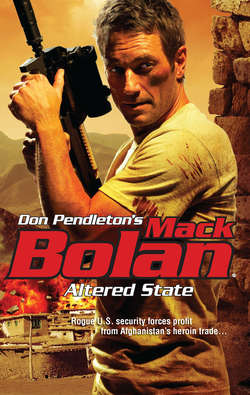Читать книгу Altered State - Don Pendleton - Страница 7
PROLOGUE
ОглавлениеBadghis Province, Northwestern Afghanistan
Black helicopters do exist.
After all the fervid speculation among UFO-watchers and conspiracy theorists, despite all the official denials and earnest assurances, unmarked whirlybirds of ill omen are seen on occasion.
And they always bear bad news.
The two aloft this morning, shortly after dawn, had lifted off from Murghab, heading northwest toward the border of Turkmenistan. They did not mean to cross the border, although such a violation of the law would not be out of character for anyone on board.
Their destination was a mountain village called Uzra, inhabited by peasants who had caused more trouble than their tiny lives were worth. This day, the men who called the shots were settling old accounts.
The black choppers were both Sikorsky UH-60L Black Hawks, each with a two-man crew and complement of twelve troops aboard, capable of cruising at 173 miles per hour with a top-end do-not-exceed speed of 222 mph. Their combat radius was 368 miles, but this morning’s jaunt covered only a fraction of that distance.
Each Black Hawk was armed—one with a door-mounted 7.62 mm M-60D machine gun, the other with an M-134 Minigun that spewed armor-piercing bullets from an electrically driven rotary breech at a rate of 4,000 rounds per minute.
Beyond that basic airborne armament, each member of the strike team carried either some variant of the M-16 assault rifle or a Mossberg 590-A1 12-gauge shotgun loaded with No. 4 buckshot—averaging seven hits per round on a man-size target at fifty yards. Most carried pistols of their own selection, chambered for 9 mm Parabellum or .45ACP, and all were packing grenades.
Just in case.
Most of the villagers in Uzra were awake and eating breakfast when the war birds fell upon them, dropping from the newly risen sun to skim at rooftop level, starting with a solid strafing run to soften up the target. The M-60D was brutally efficient, spitting death at a cyclic rate of 550 rounds per minute, but its stutter was eclipsed by the high-tech buzz of the Minigun shredding roofs, walls and bodies below.
Uzra was on the smallish side, for an Afghani village. Its population estimates waffled between 150 and 200 residents in winter, when the sheep stayed close to home. But this was spring, so an even hundred would be a closer count.
The inconvenience caused by Uzra’s citizens was out of all proportion to their numbers and position in Afghan society. Someone had not impressed them with their innate insignificance, and now they had to pay the price for stepping out of bounds.
Ten seconds, circling once around the place with weapons spraying in full-auto mode, turned Uzra into a chaotic shambles. Men, women and children ran or staggered from their riddled dwellings, seeking shelter they would never find, some of them dropping in their tracks to rise no more.
“That’s plenty,” said the strike team leader to his pilot. “Put us on the deck.”
Phase Two was mopping up and making sure that no one lived to profit from the lesson they had learned that morning.
Uzra, after all, was not a classroom.
It was an example.
Touchdown was a gentle bump in the midst of a dusty whirlwind whipped by the Black Hawk’s spinning rotors. Rising from his seat, the strike team leader faced his soldiers and reminded them, “No prisoners!”
They rushed past him toward the open bay, some snarling, others smiling as they jumped off into Hell on Earth.
